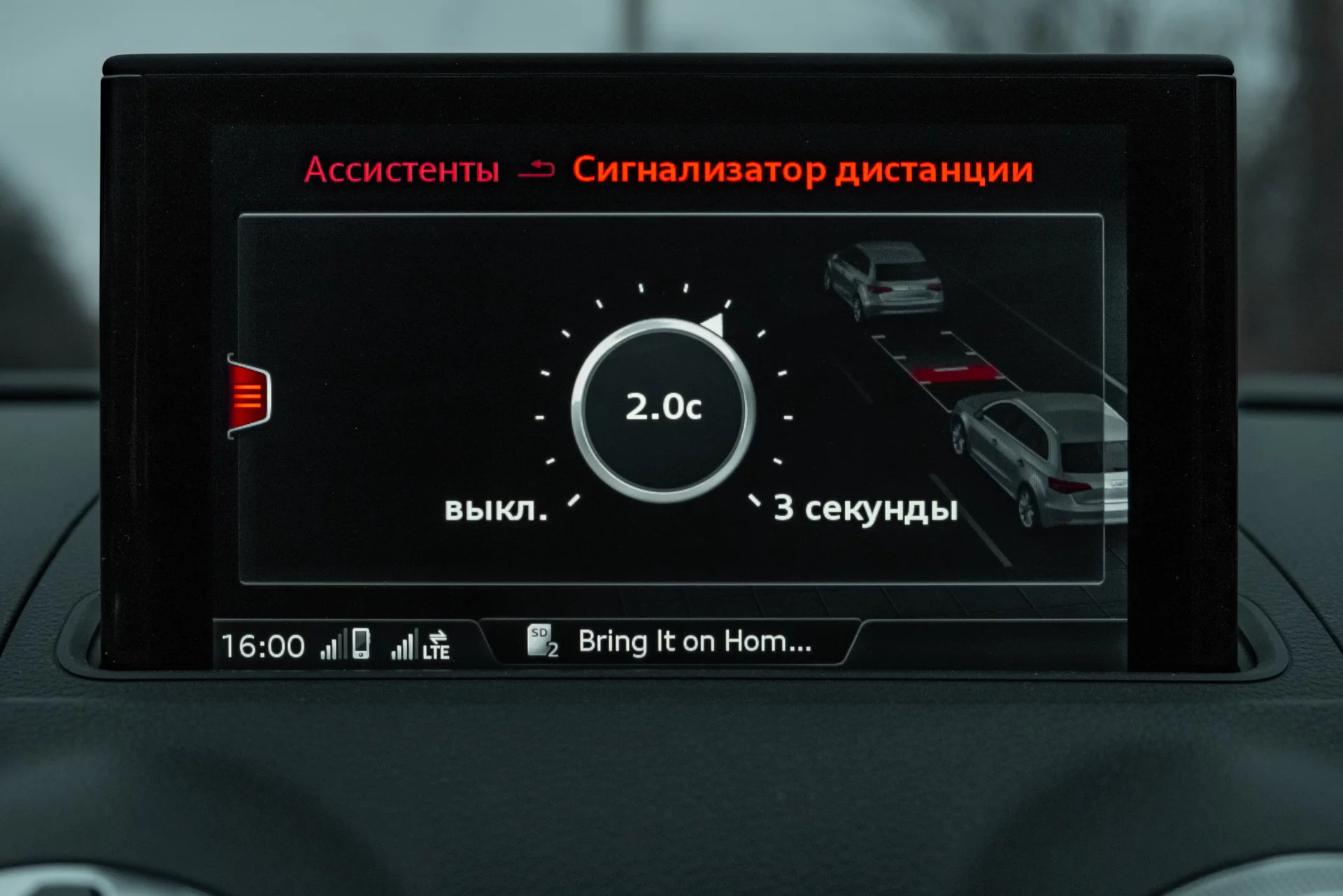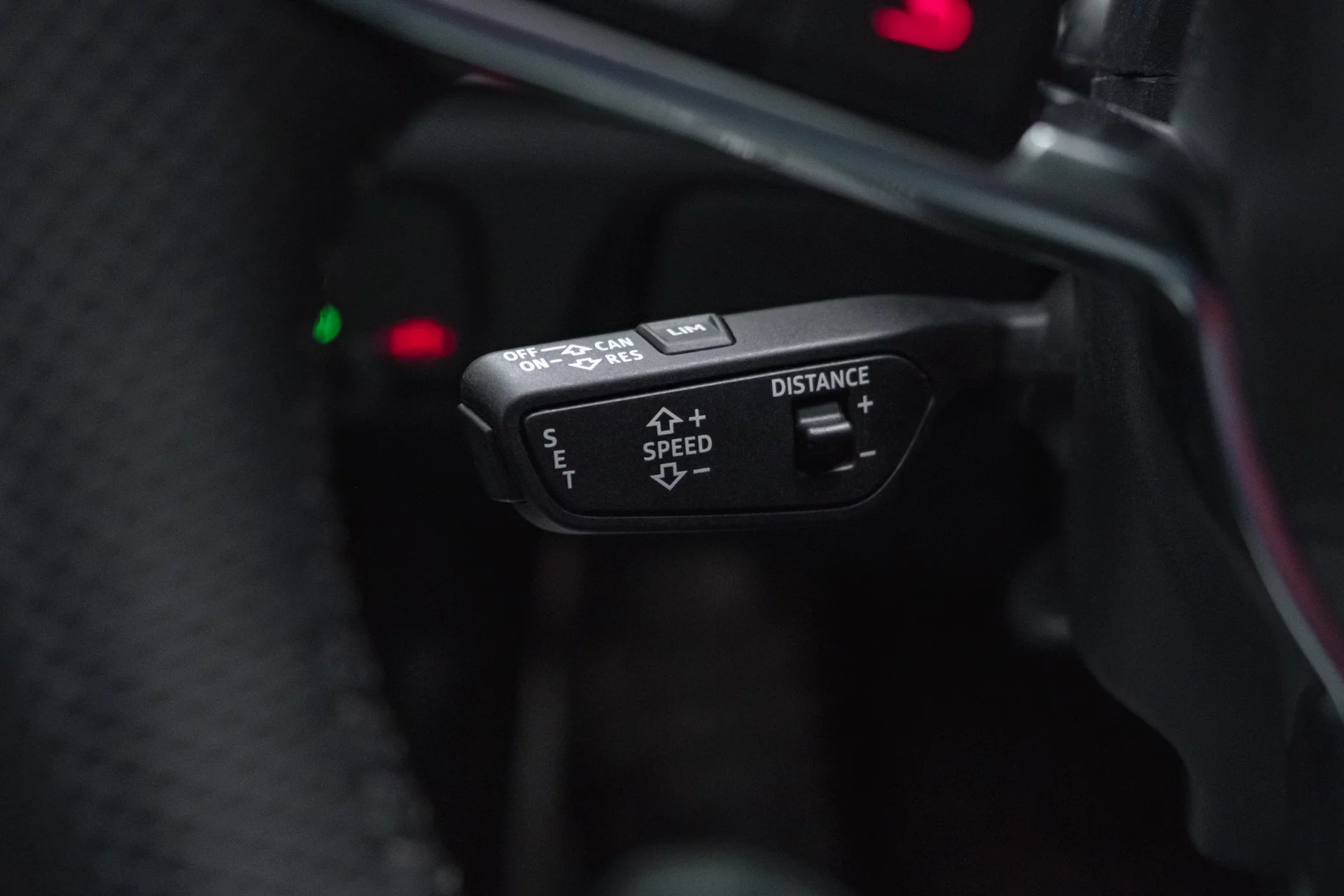The option I was dreaming about since the purchase of the car. The radar itself was mounted with S Line Exterior Package, and I finally found a time to activate it.
Technically, the Adaptive Cruise Control function is implemented using an encapsulated antenna that emits and receives radio waves reflected from metal objects. Distance to the car in front is measured by the response time, and the radar controls the gap through commands to the engine and ABS. In addition to the driver’s active function, it is responsible for several others in Audi Pre-sense package.
In 2017-2019, most countries passed laws requiring manufacturers to equip new vehicles with active safety systems. Before that, the radars were expensive toys for tech geeks, and now they are installed in all European VW / Skoda / Seat / Audi. VAG found a way to get the money flow and disables the distance control for the driver through SWaP codes, but keeps it working in the background for safety features. Owners of the “free” radar need to pay for codes to official service or do a hacked activation.
Three generations of the system was released so far, the fourth one is coming in 1-2 years.

The first generation of radars were installed on Audi A3 (and Golf) from 2013 and they look like hemisphere (“Eye of the Cyclopus”). They are named LRR (Long Range Radar) internally and “see” the distance of 250 meters, active from 30km/h.
- 5Q0 907 541 H, L, P ― ACC High version, 210km/h max speed
- 5Q0 907 541 J, M, N ― ACC Low, 160km/h max speed
They have added Stop-n-Go function in firmware updates around 2015, but it wasn’t there from the beginning. Right model of ABS sensors is also required.
In 2015, they replaced Cyclopus to the new, flat version of the radar: MRR1Plus (Middle Range Radar) with 160 meters max distance. Radars became cheaper, but along the distance, speed was also limited to 160 km/h. They’ve added an additional CAN-bus to restore the previous numbers – it links radar to the windshield (ALA) camera. They communicate messages and work together to reach that 210 km/h max speed. All MRRs had Stop-n-Go support from the beginning.
Facelifted A3 got the third generation radars, MRRevo14F. They removed the calibration mirror from its enclosure.
- 5Q0 907 561 A, B, D, F, K ― ACC Low, max speed 160 км/ч
- 5Q0 907 561 H, G, N ― ACC High, max speed 210 км/ч, no matter the presence of an ALA camera
Parts
I bought the radar with mounting bracket and set of wires on Aliexpress.
- 5Q0 907 461 ― sensor bracket with calibration bolts
- 8V0 907 574 C ― bracket to the bumper beam
- WHT 005 869 ― M5 bolts
Choose one of those:
- 8V0 907 224 ― LRR radar plastic cover (image)
- 8V0 907 224 A ― MRR radar cover (image)
- 8V0 907 224 C ― MRR radar cover with a blazer, A3 facelift (image)
You can use any MRR cap from Golf (image), Octavia, other cars. Its just a matter of appearance.

You will also need a new front bumper grille with a hole for the radar beneath. Instead, many retrofitters cut out a central part of the fin in the existing grille.
New two-way ABS sensors are also a prerequisite, and a new steering wheel stalks with distance control joystick. I installed them previously. The ACC can work with the CC lever – you will still be able to change the distance in the MIB2 user interface.
One more (unnecessary) prerequisite is a new instrumental cluster. Cars equipped with ACC have their own version with red triangles around the speed dial (photo). Virtual Cockpit is a universal solution – it has graphics for all modes and assistants.
Installation
New wiring was run through the engine shield when installing the new front bumper. The power is connected to fuse F32, and the CAN-Extended bus goes to pins 7 / 17 in the gateway.

Here is a pretty descriptive report of the same installation. There is a nuance with the bracket - it could be screwed on both sides. The front bumper beam of an Audi A3 has braces to mount it, but Volkswagen / Skoda cars require a different part.
Coding
You need to check the flags of radar presence in 01 – engine, 03 – ABS, 09 – BCM, 17 – instrument cluster, and 5F ― MIB units. Everything is described in detail in the famous XaGiCo DOSSIER manual for Golf 7 or in this article on MQB.pl.
Newer radar firmwares (0654, 0682, 0771) got a longer coding, and I had to update my VCDS (20.12+) to see the labels of the bytes. ODIS or VCP suits better in this particular case.
Calibration
After you coded everything and removed Component Protection the only thing left is initial calibration. You can go to a dealer or make a DIY stand: it looks like a vertical sheet of metal (or glass?) with a laser pointer in the center. The reflection of it from the radar is used for fine alignment. The third (and rarely mentioned) method is to simply write in horizontal and vertical angles (0 / 0) to the radar with ODIS switched to “Developer Mode”. They are recognized as a result of calibration, and the error will disappear.
Daily Experience
Front radar adds 3 new items under the “Assistants” section: Adaptive Cruise Control, Distance Control, Audi Pre-sense.

Drive program selection applies to the acceleration AND braking at the same time: “dynamic” does it very much like I’m used to, but the car brakes at the very late moment with a heavy wiggle at the end.

MRR radars have a Stop-n-Go function: full stop and the ability to start driving after it (automatically within 2 seconds, or by pressing a button after them). It allows you to use ACC in the city and heavy traffic. As a bonus, the radar controls Start-Stop and starts the engine when the car in front of you starts moving on a green light.


Distance Control starts automatically from 65km/h speed and disappears at 60km/h. The distance is measured in seconds (surprisingly!) before the crash with the car in front of you.



I didn’t manage to capture on camera the moment the Audi Pre-sense is triggered – it’s DANGEROUS.
There are 3 levels of interaction:
- Warning in the cluster + beep
- Light pulsating braking
- Extreme stop to the zero.

Speed Limiter
I didn’t know about this function till the last moment. The LIM button on the stalk controls the maximum speed a car can reach. It is very convenient in a city usage with tons of speed cams everywhere. Coding is very simple:
Engine 01, enable:
Byte 6 Bit 2: Speed Limiter installed
Steering Wheel 16, enable:
Byte 1 Bit 2
Byte 1 Bit 6


Comments
temp temp